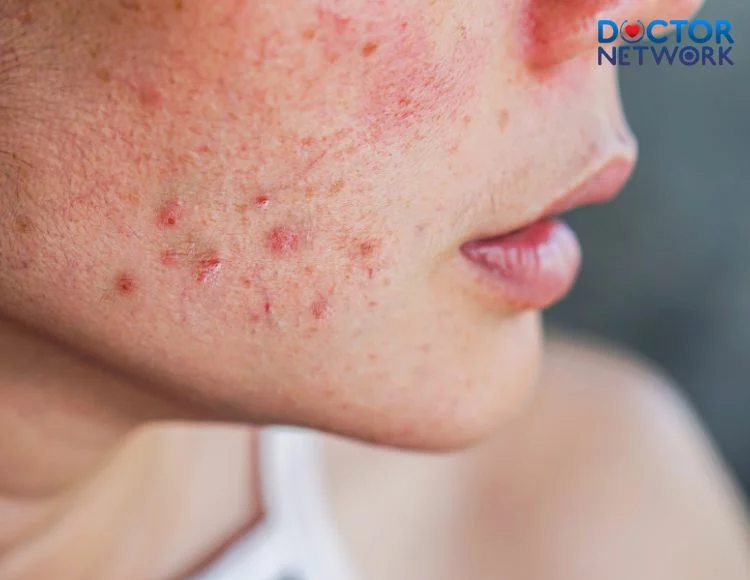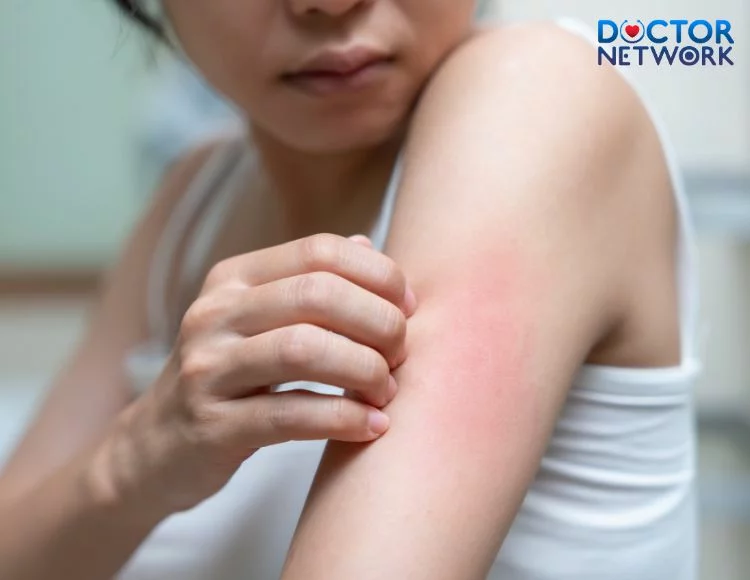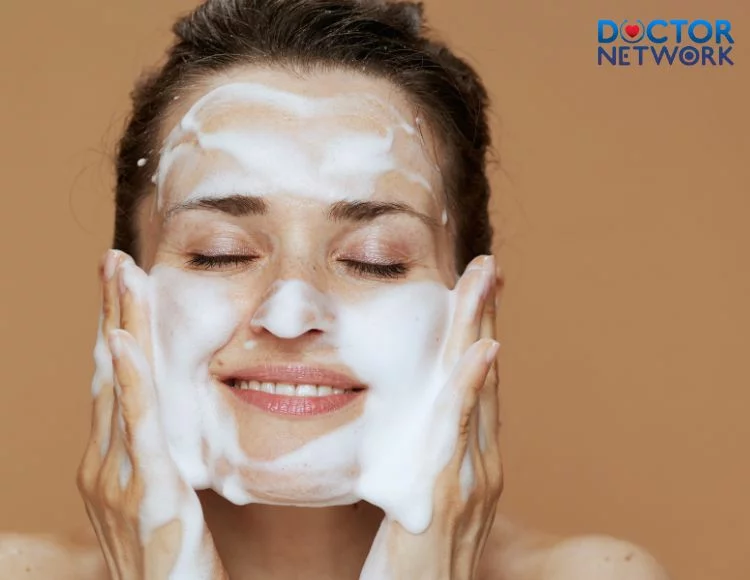When facial skin exhibits redness and itching, it is often a sign of an allergic reaction. Key symptoms include redness, swelling, and sensations of itching and burning. Timely management is crucial to prevent the risk of spreading, skin infection, and negative psychological impacts. Let’s explore in detail the question, “what to do when face is red and itchy” through the following article.
Causes of Facial Redness and Itching
Allergic Skin Reactions and Other Causes
Skin allergies are one of the primary causes of redness and itching on the face. Common allergens include chemicals in cosmetics, makeup, or skincare products that are not suitable for an individual’s specific skin type. Additionally, allergies can arise from contact with other irritants such as medications, foods, or animal secretions.

Skin allergies are one of the primary causes of redness and itching on the face
Contact with Allergens
Direct or indirect contact with allergens can be a direct cause of redness and itching on the face. Chemical products, beauty substances, and even some types of fabric can trigger allergic reactions on facial skin.
Environmental and Genetic Factors
Environmental and genetic factors also play significant roles in causing facial redness and itching. Polluted environments, strong sunlight, or even climatic factors can irritate sensitive skin and trigger allergic symptoms. Moreover, genetics play a crucial role as skin issues can be inherited from one generation to another, making some individuals more susceptible.
Symptoms and Manifestations of Red and Itchy Face
Description of Specific Symptoms
Symptoms typically experienced include:
- Redness: Red spots or an entirely red skin surface on the face.
- Swelling: The skin may swell, feeling heavy and tight.
- Itching: This sensation can cause discomfort and irritation, often leading to scratching that can damage the skin.

This sensation can cause discomfort and irritation, often leading to scratching that can damage the skin
- Burning Sensation: Sometimes, redness and itching are accompanied by a burning or uncomfortable feeling.
Impact on Quality of Life
Facial redness and itching not only cause physical discomfort but also affect the daily life quality of patients. These symptoms can diminish their confidence in social interactions and communication. Furthermore, constant itching can degrade sleep quality, leading to fatigue and stress. Additionally, scratching can cause skin damage and infection, increasing the risk of recurring redness and itching, which can negatively impact the patient’s mental and emotional health.
Understanding the symptoms and impacts of redness and itching is essential for patients to find effective management and treatment strategies, thereby improving their quality of life.
Management and Treatment Options for Red and Itchy Face
Medical Consultation and Examination
What to do when face is red and itchy? The first step for patients experiencing red and itchy faces is to seek professional medical advice and consult a dermatologist. The doctor will conduct a thorough interview to gather information about the patient’s medical history and living environment, and inspect and assess the skin condition to develop an appropriate treatment plan.
Common Treatment Methods – what to do when face is red and itchy
What to do when face is red and itchy? Treatment methods for red and itchy faces may include:
- What to do when face is red and itchy – Anti-inflammatory Creams and Antihistamines: To reduce itching sensations and inflammation.
- Allergy Medications or Corticosteroids: To alleviate allergy symptoms and reduce redness.
- What to do when face is red and itchy – Prescribed Moisturizing Creams and Therapeutic Ointments: To provide moisture and soothe red and itchy spots.
Prevention of Recurrence
To prevent the recurrence of redness and itching, patients can:
- Avoid contact with previously identified allergens.
- Use gentle, chemical-free skincare products.
- Protect skin from the sun’s rays with sunscreen and wide-brimmed hats when outdoors.
By combining medical consultations and strictly adhering to treatment and prevention measures, patients can effectively reduce symptoms and prevent the recurrence of redness and itching on their faces.
Skin Care After Experiencing Redness and Itching
Use Products Suitable for Sensitive Skin
After experiencing a bout of redness and itching, using products designed for sensitive skin is crucial. Choosing products free from irritating chemicals like alcohol, parabens, fragrance, and preservatives can minimize the risk of recurrence. Skincare products containing gentle ingredients like aloe vera, chamomile, and ceramides can also help soothe and moisturize the skin.
Maintain Facial Hygiene
Proper facial cleansing is a critical step in the skincare routine after experiencing redness and itching. Use mild, non-irritating facial cleansers, avoid alcohol-containing and harsh chemical products, and wash daily to remove dirt, excess oil, and impurities. However, limit washing to avoid drying out the skin excessively.

Proper facial cleansing is a critical step in the skincare routine after experiencing redness and itching
Monitor Skin Condition and Recommend Appropriate Skin Care
After a flare-up of redness and itching, controlling the skin condition and implementing appropriate skincare measures are important to prevent recurrence. This may include using moisturizing creams with gentle and hydrating ingredients, undergoing mild exfoliation therapies, and following dermatologist-recommended skin regeneration treatments.
By correctly and professionally implementing post-redness and itching skincare measures, patients can keep their skin healthy, reduce the risk of recurrence, and maintain a youthful and healthy complexion.
Related studies about “what to do when face is red and itchy”
Here are some scientific about “what to do when face is red and itchy“:
1. A 2014 study published in the Journal of Clinical and Aesthetic Dermatology suggests that avoiding contact with allergens is the best way to alleviate symptoms.
2. The 2016 article “The Effect of Anti-Itch Creams,” published in the Journal of Allergy and Clinical Immunology, discusses various anti-itch creams and their applications.
3. A 2018 study from the British Journal of Medical Dermatology shows that anti-itch creams can effectively reduce itching symptoms.
4. A 2019 study from the same journal indicates that cold compresses can effectively reduce swelling and itching.
5. A 2020 study suggests that oatmeal baths can alleviate symptoms of eczema.
Recognizing and addressing the issue of “what to do when face is red and itchy” is crucial in skincare. Redness and itching not only cause physical discomfort but also negatively impact the psychological well-being and daily life quality of patients. This emphasizes the importance of seeking professional medical help to ensure effective treatment and skin care.
References:
https://www.aad.org/public/everyday-care/skin-care-secrets/face/facial-redness
https://www.verywellhealth.com/red-skin-5087775
https://www.aad.org/public/diseases/rosacea/what-is/red-face
Kiểm Duyệt Nội Dung
More than 10 years of marketing communications experience in the medical and health field.
Successfully deployed marketing communication activities, content development and social networking channels for hospital partners, clinics, doctors and medical professionals across the country.
More than 6 years of experience in organizing and producing leading prestigious medical programs in Vietnam, in collaboration with Ho Chi Minh City Television (HTV). Typical programs include Nhật Ký Blouse Trắng, Bác Sĩ Nói Gì, Alo Bác Sĩ Nghe, Nhật Ký Hạnh Phúc, Vui Khỏe Cùng Con, Bác Sỹ Mẹ, v.v.
Comprehensive cooperation with hundreds of hospitals and clinics, thousands of doctors and medical experts to join hands in building a medical content and service platform on the Doctor Network application.

























